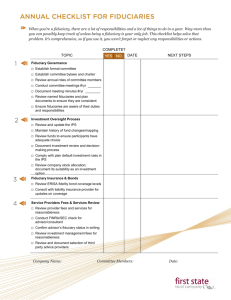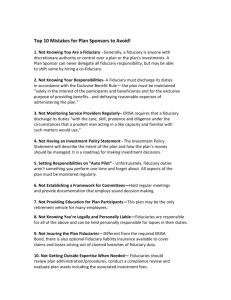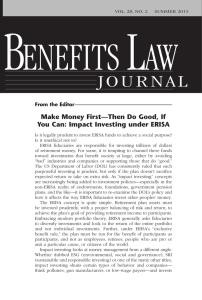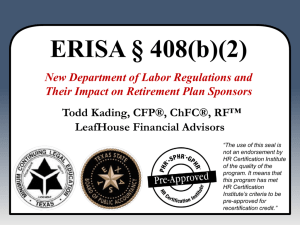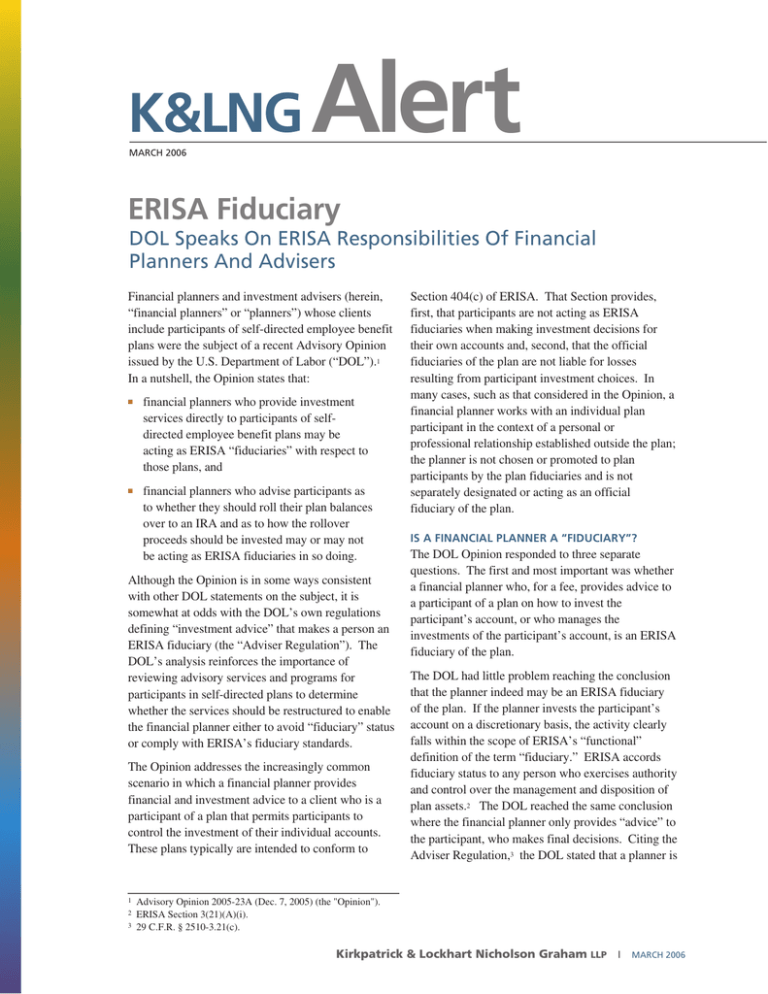
K&LNG
MARCH 2006
Alert
ERISA Fiduciary
DOL Speaks On ERISA Responsibilities Of Financial
Planners And Advisers
Financial planners and investment advisers (herein,
“financial planners” or “planners”) whose clients
include participants of self-directed employee benefit
plans were the subject of a recent Advisory Opinion
issued by the U.S. Department of Labor (“DOL”).1
In a nutshell, the Opinion states that:
■
financial planners who provide investment
services directly to participants of selfdirected employee benefit plans may be
acting as ERISA “fiduciaries” with respect to
those plans, and
■
financial planners who advise participants as
to whether they should roll their plan balances
over to an IRA and as to how the rollover
proceeds should be invested may or may not
be acting as ERISA fiduciaries in so doing.
Although the Opinion is in some ways consistent
with other DOL statements on the subject, it is
somewhat at odds with the DOL’s own regulations
defining “investment advice” that makes a person an
ERISA fiduciary (the “Adviser Regulation”). The
DOL’s analysis reinforces the importance of
reviewing advisory services and programs for
participants in self-directed plans to determine
whether the services should be restructured to enable
the financial planner either to avoid “fiduciary” status
or comply with ERISA’s fiduciary standards.
The Opinion addresses the increasingly common
scenario in which a financial planner provides
financial and investment advice to a client who is a
participant of a plan that permits participants to
control the investment of their individual accounts.
These plans typically are intended to conform to
1
2
3
Section 404(c) of ERISA. That Section provides,
first, that participants are not acting as ERISA
fiduciaries when making investment decisions for
their own accounts and, second, that the official
fiduciaries of the plan are not liable for losses
resulting from participant investment choices. In
many cases, such as that considered in the Opinion, a
financial planner works with an individual plan
participant in the context of a personal or
professional relationship established outside the plan;
the planner is not chosen or promoted to plan
participants by the plan fiduciaries and is not
separately designated or acting as an official
fiduciary of the plan.
IS A FINANCIAL PLANNER A “FIDUCIARY”?
The DOL Opinion responded to three separate
questions. The first and most important was whether
a financial planner who, for a fee, provides advice to
a participant of a plan on how to invest the
participant’s account, or who manages the
investments of the participant’s account, is an ERISA
fiduciary of the plan.
The DOL had little problem reaching the conclusion
that the planner indeed may be an ERISA fiduciary
of the plan. If the planner invests the participant’s
account on a discretionary basis, the activity clearly
falls within the scope of ERISA’s “functional”
definition of the term “fiduciary.” ERISA accords
fiduciary status to any person who exercises authority
and control over the management and disposition of
plan assets.2 The DOL reached the same conclusion
where the financial planner only provides “advice” to
the participant, who makes final decisions. Citing the
Adviser Regulation,3 the DOL stated that a planner is
Advisory Opinion 2005-23A (Dec. 7, 2005) (the "Opinion").
ERISA Section 3(21)(A)(i).
29 C.F.R. § 2510-3.21(c).
Kirkpatrick & Lockhart Nicholson Graham LLP |
MARCH 2006
an ERISA fiduciary if the circumstances indicate
there is an agreement or understanding, “written or
otherwise,” that the advice will serve as a primary
basis for the participant’s investment decisions.
The DOL also pointed out that a planner “would be
liable” for imprudent investment decisions by the
participant, regardless of whether the plan is subject
to Section 404(c). Although Section 404(c) provides
that fiduciaries generally are not liable for the results
of participant investment decisions, in this case the
investment decisions would result from the planner’s
exercise of discretion or provision of investment
advice, rather than from the participant’s exercise of
“control” over his or her investments. The
protections afforded by Section 404(c) would not,
therefore, apply to the financial planner. The
Opinion did include a bit of good news - for the
“other” plan fiduciaries. If the plan is covered by
Section 404(c), they, unlike the financial planner, are
not liable for the results of the participant’s decisions
(based on the planner’s advice).4
THE ADVISER REGULATION
The DOL’s point about “investment advice”
reiterates a position it took in its 1996 Interpretive
Bulletin on investment education,5 but it is not
completely consistent with the terms of the Adviser
Regulation. The Adviser Regulation, which was
adopted in 1975, states specifically that a person is
an ERISA fiduciary by reason of giving investment
advice “only if” the person gives the advice “to the
plan” under an agreement or understanding between
the adviser “and the plan or a fiduciary with respect
to the plan” that the advice will be relied upon in
making investment decisions for the plan.
In the scenario addressed by the Opinion, the
participant would not, by reason of Section 404(c),
be a fiduciary of the plan. The DOL assumed
moreover that no other plan fiduciary chose or
promoted the financial planner as an investment
adviser to the participants. This suggests an absence
of any “agreement” between the adviser and the plan
or a plan fiduciary regarding the planner’s advice.
The DOL in any case appeared to base its
4
5
6
7
conclusion, as it had in the Interpretive Bulletin, on
the fact that the advice relates to “plan assets,” which
is consistent with the general thrust of the statute.6
It is difficult nonetheless to reconcile the Opinion (or
the Interpretive Bulletin) with the literal terms of the
Adviser Regulation, which raises the question of
whether the Adviser Regulation should be revised
pursuant to the normal (and required) formalities of
the administrative process.
ROLLOVERS AND SUBSEQUENT INVESTMENTS
The second and third questions related to financial
planner recommendations that a participant roll his or
her account balance over to an IRA to take advantage
of investments not available under the plan. Here,
the DOL concluded that merely advising a
participant to take a distribution is not considered
“investment advice” that makes the planner a
fiduciary, even if the advice also includes a
recommendation as to how the distribution should be
invested. Such advice is not, in the DOL’s view,
advice regarding specific investments of plan assets,
as contemplated by the Adviser Regulation. It
follows that, once the assets are distributed, the
planner’s advice regarding investments would relate
to assets that no longer are “plan assets.” The DOL
also stated that a planner who recommends particular
investments for assets to be rolled over to an IRA in
this scenario does not engage in a prohibited
transaction, even if the planner will receive
management or investment fees from that IRA.
The DOL, however, added an important caveat to
this analysis: if a financial planner who already is a
plan fiduciary makes recommendations to a
participant regarding a rollover and subsequent
investments of the rollover proceeds (or exercises
discretion over the participant’s account), the planner
will be viewed as acting as a “fiduciary” of the plan,
subject to ERISA’s fiduciary duties, including the
duty to act prudently and solely in the interest of the
plan and its participants. In that situation, if the
planner advises the participant to request a
distribution and roll it over into an IRA which is
managed by that same fiduciary, the planner could be
in violation of ERISA’s restrictions against fiduciary
self-dealing and conflicts of interest.7
The DOL did note, however, that the other fiduciaries could be liable for any breach of duty by the planner under the "co-fiduciary
liability" rules of ERISA Section 405(a).
29 C.F.R. § 2509.96-1.
See ERISA Section 3(21)(A)(ii) (investment advice with respect to plan "moneys or property" is fiduciary function). ERISA Section
406(b).
ERISA Section 406(b).
2
Kirkpatrick & Lockhart Nicholson Graham
LLP
| MARCH 2006
The nature of recommendations as to the desirability
of taking a rollover distribution and investing the
proceeds appears generally to be the same in most
situations. However, the DOL’s different
characterization of the financial planner’s status as
non-fiduciary in one situation and “fiduciary” in
another reflects a broad, perhaps overly broad, view
of the impact of a preexisting fiduciary relationship.
This appears to contrast with another basic principle
recognized by the DOL (and the courts) - that a
person may be viewed as an ERISA fiduciary when
performing certain functions or engaging in certain
activities with respect to a plan, and not considered
an ERISA fiduciary when taking certain other
actions.
We would be glad to discuss Advisory Opinion 2005-23A and its implications for structuring financial
planning and advisory programs with you. Please call any of the persons listed below to discuss your
questions or request a copy of the Opinion.
LOS ANGELES
Alexandra C. Sparling
William P. Wade
310.552.5563
310.552.5071
asparling@klng.com
wwade@klng.com
202.778.9289
202.778.9024
202.778.9210
202.778.9887
202.778.9373
cbardsley@klng.com
lgalletto@klng.com
bmcparland@klng.com
dpickle@klng.com
william.schmidt@klng.com
WASHINGTON D.C.
Catherine S. Bardsley
Lori G. Galletto
Brendan S. McParland
David E. Pickle
William A. Schmidt
www.klng.com
BOSTON • DALLAS • HARRISBURG • LONDON • LOS ANGELES • MIAMI • NEWARK • NEW YORK • PALO ALTO • PITTSBURGH • SAN FRANCISCO • WASHINGTON
Kirkpatrick & Lockhart Nicholson Graham (K&LNG) has approximately 1,000 lawyers and represents entrepreneurs, growth and middle market companies, capital
markets participants, and leading FORTUNE 100 and FTSE 100 global corporations nationally and internationally.
K&LNG is a combination of two limited liability partnerships, each named Kirkpatrick & Lockhart Nicholson Graham LLP, one qualified in Delaware, U.S.A. and
practicing from offices in Boston, Dallas, Harrisburg, Los Angeles, Miami, Newark, New York, Palo Alto, Pittsburgh, San Francisco and Washington and one
incorporated in England practicing from the London office.
This publication/newsletter is for informational purposes and does not contain or convey legal advice. The information herein should not be used or relied upon in
regard to any particular facts or circumstances without first consulting a lawyer.
Data Protection Act 1988—We may contact you from time to time with information on Kirkpatrick & Lockhart Nicholson Graham LLP seminars and with our regular
newsletters, which may be of interest to you. We will not provide your details to any third parties. Please e-mail cgregory@klng.com if you would prefer not to
receive this information.
© 2006 KIRKPATRICK & LOCKHART NICHOLSON GRAHAM LLP. ALL RIGHTS RESERVED.
Kirkpatrick & Lockhart Nicholson Graham
LLP
|
MARCH 2006

